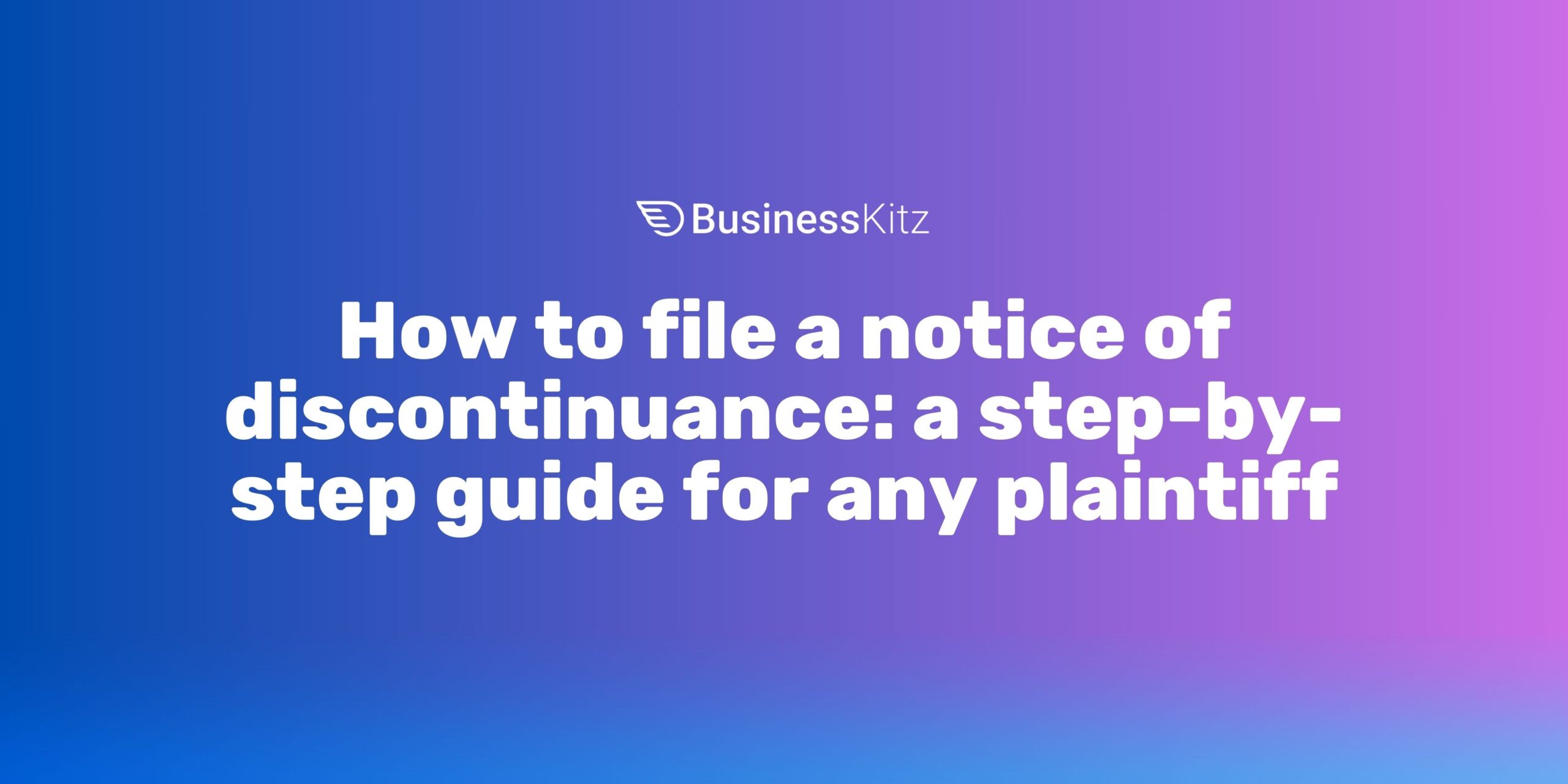
We've helped businesses save $55m with our all-in-one platform. Get instant access to this template and 115+ others, plus AI-powered document creation, starting completely free.
If you’ve started a legal case but no longer want to continue, you may need to file a notice of discontinuance. Filing a notice of discontinuance tells the court and the other party that you are ending the legal matter. It’s a formal process that protects your legal rights and helps close the case clearly.[ez-toc]
Discontinuance is the formal way to end a court case. You file a notice of discontinuance to tell the court and the other party that you no longer want to continue. It is not a win or loss. Filing a notice of discontinuance simply closes the case and protects your legal rights when done the right way.
If you've made claims in court but no longer want to proceed with your claim, you may need to file a notice of discontinuance. This legal form tells the court and the other party that you’ve chosen to stop the case. It’s a common step in many civil matters.
Discontinuance is when a plaintiff or applicant decides to stop a court proceeding. You can choose this option if you filed a statement of claim, but for any reason you no longer want to go forward with the application.When you file a notice of discontinuance, you end the matter officially. The court then closes the case, and the defendant cannot chase the claim any further—unless there are other linked proceedings.Discontinuance is not a legal win or loss. It doesn’t mean one party was right or wrong. It simply stops the matter.
There are several reasons why someone may no longer want to continue with a case:
Whatever the reason, filing a notice of discontinuance is the correct legal step if a plaintiff wants to stop a court case from moving forward.
Elena owns a small event planning business. She made a claim in court after a client failed to pay. Before the hearing, both sides agreed to a payment plan. Elena decided not to proceed with her claim. Her lawyer helped her file a notice of discontinuance. This ended the court action officially, and she was able to keep a record of it in her Business Kitz account.Discontinuance if you no longer wish to continue is a smart way to close the loop and move on without extra stress. With Business Kitz Document Vault you can securely store your legal and business documentation - get started today!

A notice of discontinuance is a formal document. It tells the court that you want to stop your case. To be accepted, this form must include key details. If you leave something out or make a mistake, the court may not process it.
When you fill out the form, you must include the following:
Each form sets out these fields clearly. If you're not sure how to fill it out, get legal advice.
Incorrect information can slow things down. These errors are easy to miss but matter a lot.Form sectionWhat to includeCommon mistakeCourt nameFull name of the correct courtUsing the wrong courtParty namesExact legal namesSpelling errors or nicknamesCase numberGiven by the courtEntering the wrong numberSignatureSigned by one party or their lawyerMissing or wrong person signed
Before you file the form, go over each part. Make sure it's correct. Even one small error can lead to delays or rejection. You must provide clear and complete information.
Before you file a notice of discontinuance, there are a few things you need to check. These steps help avoid delays and reduce risk. Skipping one can affect the whole case.
In some court matters, you must ask the court for permission to stop the case. This can happen if a judge has already made orders or if the matter has gone past a certain set point.If you're not sure, get legal advice. A lawyer can help you work out if you need to apply to the court before lodging your form.
You must serve the other party with notice of your plan to discontinue. This includes the defendant, and their lawyer if they have one. Letting them know in advance avoids confusion and supports a smooth service process later.
If you reached a settlement, make sure everything is signed and agreed. Get approval from any other person involved, such as a business partner or manager. If one person signs too early without this step, the form may be invalid.Utilise Business Kitz Document Sign tool to digitally and securely sign documents with ease. Check out our other useful features on our website.
Use this list to stay on track:
Taking these steps will save you time and help avoid unexpected costs.

Once you're ready to end your case, you need to know how to file a notice of discontinuance the right way. This keeps things clear for the court, the other party and your own legal records.
Courts accept notice of discontinuance forms in a few ways. The method depends on which court you're dealing with.You can usually submit the form by:
Check the court’s website before choosing a method. Each court may have its own rules for how to submit.
Use this process to make sure your form is accepted the first time:
Filing a notice of discontinuance is a simple step when you follow the right process. Stay clear, stay accurate and always save your records. You can securely store your documentation with Business Kitz Document Vault.
Once you have filed your notice of discontinuance, the next step is to serve it. This means giving a copy to the other party. Service is a legal rule, not just a formality. If you miss it, the court may not close your case.
You must serve the notice on:
Serving the wrong person or not serving anyone at all can delay your case or cause extra cost. Always check who is listed on the court file.
There are a few legal ways to serve your notice. The court may have rules about which method to use, so always check before choosing one.MethodProsConsEmailFast and timestampedSome courts may not accept itRegistered postOffers proof of deliverySlower and may delay confirmationIn-person deliveryGives instant confirmationCan take more time and effortWhichever method you choose, make sure you can prove the other party got the form. You may need to provide this proof to the court.
Proof of service protects your legal rights. It shows you followed the rules and gave proper notice. Without it, the court may not accept the discontinuance.Stay organised, follow the rules and get legal advice if you’re unsure. Serving the discontinuance notice the right way ensures your case is properly closed.
Filing a notice of discontinuance does not mean everything ends. You still have legal duties. You may also face limits on what you can do next. It’s important to know what happens after you stop your case.
Even if you stop your proceeding, you may still have to pay costs. The court can order you to cover the other party’s legal fees. This often happens if you discontinue late in the case.Discontinuance doesn’t cancel past costs either. If the court made earlier orders, you must follow them. Always check what legal duties remain before closing the file.
Once you file a notice of discontinuance, you may not be allowed to bring the same claim in court again. The court could stop you from re-filing unless you obtain special permission. This applies even if you made a mistake in the first application.If you leave out key facts or didn’t fully understand your rights, you may not get another chance. That’s why it helps to get legal advice before you discontinue.
Michael filed a notice of discontinuance after resolving a billing issue. He forgot about earlier cost orders made by the court. He used stored notes and reminders to follow up and avoid more legal trouble.Even after your case ends, the rules still apply. Stay informed and organised to avoid new problems.

Once you have filed and served your notice of discontinuance, the case is officially closed. But that doesn’t mean you can forget about it. You must keep a clear, secure record of the form and any court response. You may need it later.
A copy of your discontinuance can protect your business. You might need it to:
If you misplace your documents, it can cost you time and money. You may have to contact the court again or even re-submit details.
Paper copies can fade, tear, or get lost. You may store them in the wrong folder or file them under the wrong name, which is risky, especially if months or years have passed.
Business Kitz gives you a secure way to manage your legal records. You can:
Sign up for a free Business Kitz account today!
Sarah filed a notice of discontinuance after a lease dispute. A year later, a new tenant raised a question linked to the same matter. Sarah logged into her Business Kitz account and found her record in seconds. She sent it to her lawyer and avoided extra costs.Keeping your discontinuance record safe isn’t just smart—it’s essential. Store it well and stay ready for whatever comes next.
A notice of discontinuance is a legal form used to stop a court case. It tells the court and the other party that the plaintiff no longer wants to continue with the claim. This ends the proceeding officially if done correctly.
The party who started the case, usually the plaintiff or applicant, can file the notice. In some situations, they may need the court’s permission first. Always get legal advice before filing.
The notice must include the court name, party names, case number, date and signature. Missing or wrong details can cause delays. Always double-check your form before submitting it.
Yes, you may still need to pay legal costs. The court can order one party to pay the other’s costs, especially if the case has gone on for a while. Get legal advice to understand your obligations.
In most cases, no. Once you file a notice of discontinuance, you may not be able to file the same claim again. You might need special permission. This depends on the court and your situation. A lawyer can help determine your options.
You can file it at the court where your case began. For example, if your matter is in the Federal Court, use their eLodgment system. Other courts may take forms by post or in person. If you are unsure where to file your notice, you can get legal advice.
You can serve the notice by email, post or in person. Each method has different rules. You must prove that the other party received it.
Keeping a secure record helps if issues come up later. You may need to show proof of discontinuance in an audit or review. Digital storage is safer than paper and easier to access if needed.
Mistakes can delay your case. If you're unsure about how to fill it in, get legal advice early.
No. Each court may have its own rules. For example, the Federal Court has its own form and filing system. Always check the specific court’s website for up-to-date steps and requirements. General rules apply, but small differences matter.
A notice of discontinuance lets you end a case the right way. It’s a formal step that protects your rights and tells the court you're no longer moving forward. But to be effective, you must get the details right.You need to follow each step carefully—check if you need permission, fill out the form correctly, serve the other party and keep proof. Small errors can lead to delays or extra costs.Use Business Kitz to simplify, sign and store your legal documents with confidence. Sign up today!Disclaimer: This content is intended to be used for educational and informational purposes only. Business Kitz does not offer legal advice and cannot guarantee the accuracy, reliability, or suitability of its website content for a particular purpose. We encourage you to seek professional advice from a licensed professional and verify statements before relying on them. We are not responsible for any legal actions or decisions made based on the information provided on our website.Unless expressly stated otherwise, all content, materials, text, images, videos and other media on this website and its contents are the property of their respective copyright owners.
Copyright © 2025 Business Kitz 14312161